The benefits of breastfeeding extend well beyond basic nutrition. In addition to containing all of the vitamins and nutrients a baby needs in the first six months of life, breast milk is packed with disease-fighting substances that help protect babies from illness.
While breastfeeding is natural, it does not always come easy to new moms, or their babies. Hendricks Regional Health is here to help. Our lactation experts are available to answer any questions you may have about feeding your infant. To contact our lactation department, call (317) 745-8448 or email lactation@hendricks.org.
Meet Our Lactation Experts
Elizabeth Brewer, RN, IBCLC

Lorra Bryant, RN, RNC-OB, IBCLC
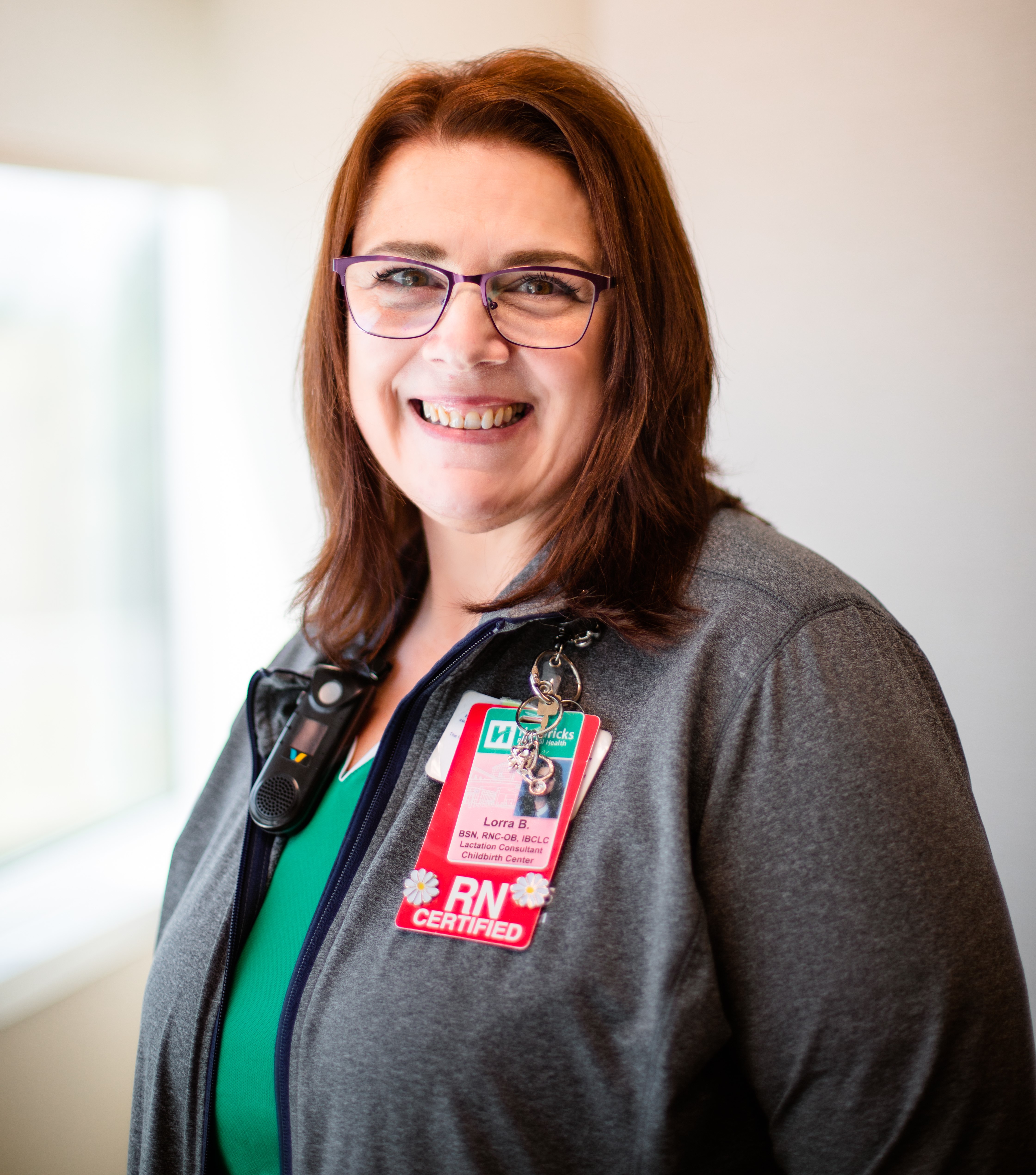
Kimberly Flora, RN, IBCLC, LCCE

Theresa Holland, MSN, BS, IBCLC, ICCE
Lactation Coordinator

Renee Majors, RN, IBCLC
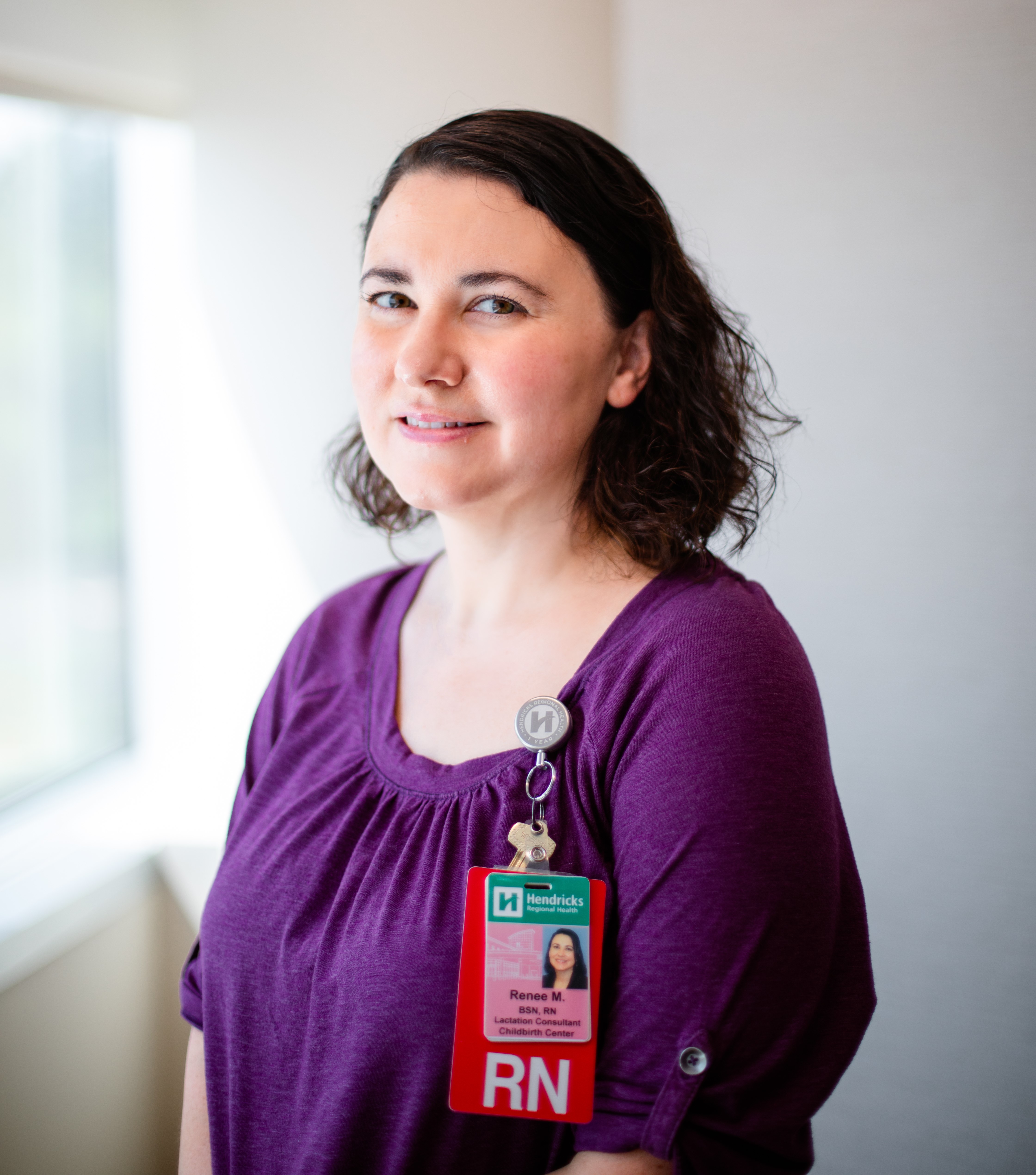
Kristi Tronc, RN, IBCLC
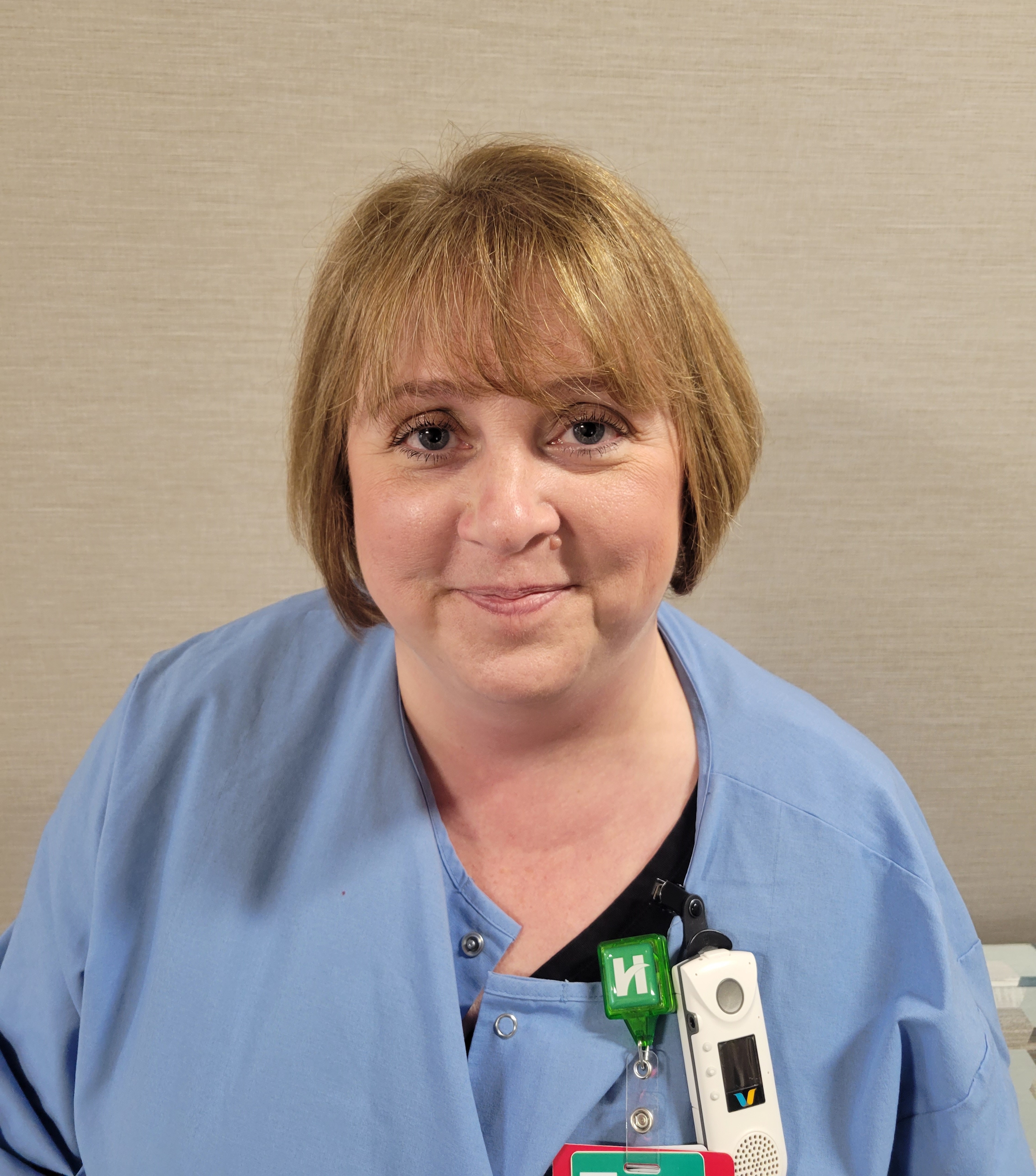
Before You Begin: Breastfeeding Basics
What are the benefits of breastfeeding?
The benefits of breastfeeding are astounding and being uncovered every day by medical science. Here are just a few of the benefits:
Is there really a difference between breast milk and formula?
Absolutely! Your breast milk is tailor-made to meet your specific baby's needs and cannot be duplicated. Breast milk provides more than just calories and protein; it provides the building blocks for your baby's health from day one. Your milk changes from feeding to feeding and from month to month to support your baby's ongoing development.
Setting your own goals is important in your decision to breastfeed. Begin by thinking about the benefits of breastfeeding and your own personal situation and develop a plan to help you reach your goals, whatever they may be.
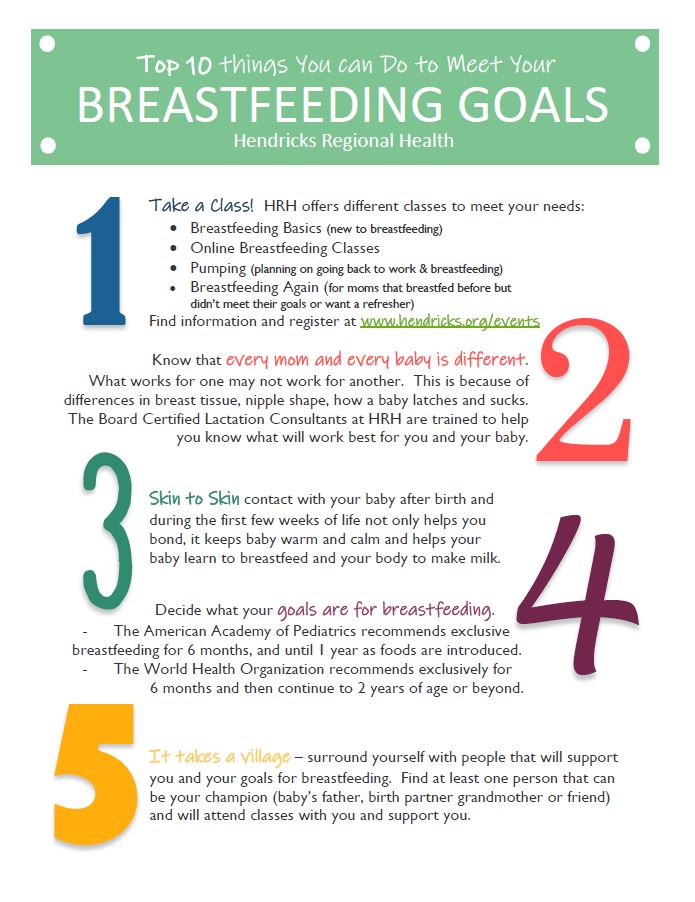 Top 10 Things You Can Do To Meet Your Breastfeeding Goals
Top 10 Things You Can Do To Meet Your Breastfeeding Goals
The American Academy of Pediatrics recommends: "...exclusive breastfeeding for about the first six months of a baby's life, followed by breastfeeding in combination with the introduction of complementary foods until at least 12 months of age, and continuation of breastfeeding for as long as mutually desired by mother and baby." The World Health Organization (WHO) recommends: "... mothers worldwide to exclusively breastfeed infants for the child's first six months to achieve optimal growth, development and health. Thereafter, they should be given nutritious complementary foods and continue breastfeeding up to the age of two years or beyond."
At Hendricks Regional Health, we understand the importance of a good start and will support and encourage you through your hospital stay in order that your goals may be met. Evidence shows those moms who exclusively breastfeed for the first few days produce more milk and have increased confidence. After birth, the introduction of supplemental formula may be indicated in a rare cases as a medical intervention; however, with lactation support your baby can receive only your breast milk.
Prenatal breastfeeding classes are offered every month at Hendricks Regional Health. Taught by an International Board Certified Lactation Consultant (IBCLC), this two-hour class will provide you with the basics of breastfeeding and include a video presentation, question-and-answer time, and even some practice with positioning and holds. Moms and partners are encouraged to attend together.
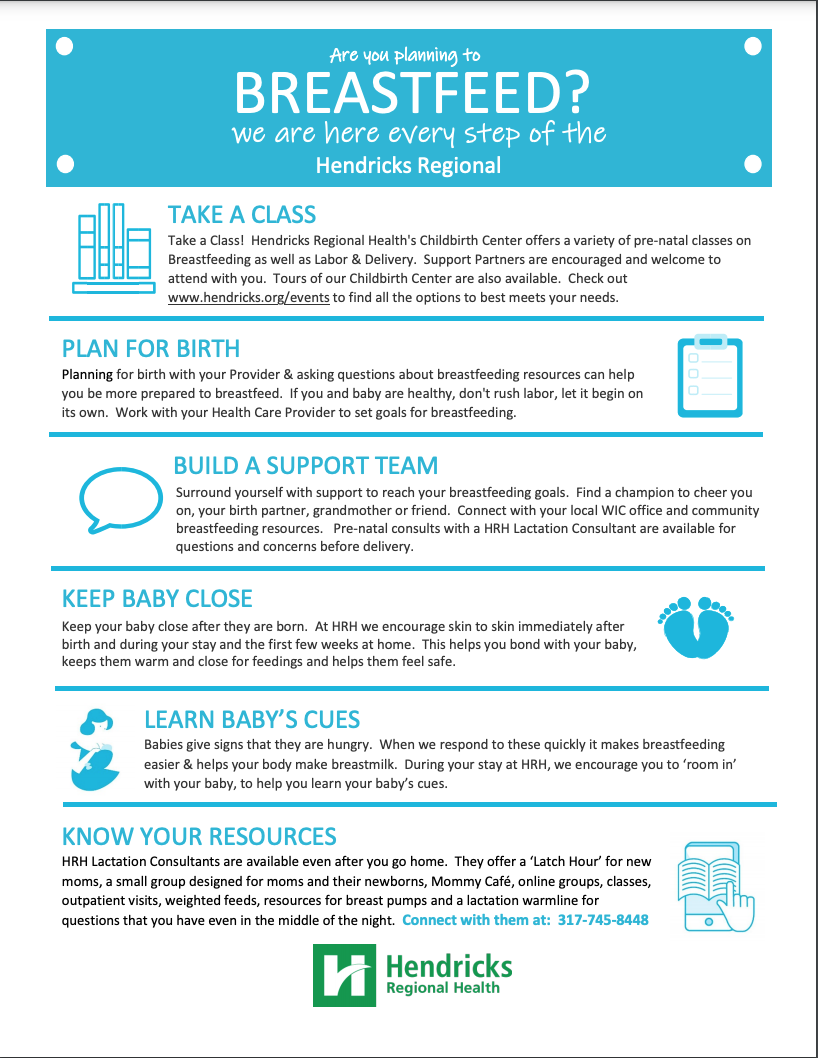 Plan Your Breastfeeding Journey
Plan Your Breastfeeding Journey
Check out hendricks.org/events for all classes related to childbirth and new moms.
Classes are available online and in-person and is one of the best ways to prepare to accomplish your goals with Breastfeeding. We offer classes on:
- Breastfeeding Basics (new to breastfeeding)
- Online Breastfeeding Classes
- Pumping (planning on going back to work & breastfeeding)
- Breastfeeding Again (for moms that breastfed before but didn’t meet their goals or want a refresher)
- Labor & Delivery
- Infant Care & Postpartum
5. What should I bring to the hospital?
We have everything you need to have a baby, but there may be a few items you will want to bring with you that can be helpful and provide comfort. We suggest you bring your breast pump so that we can teach you how to use it before you go home.
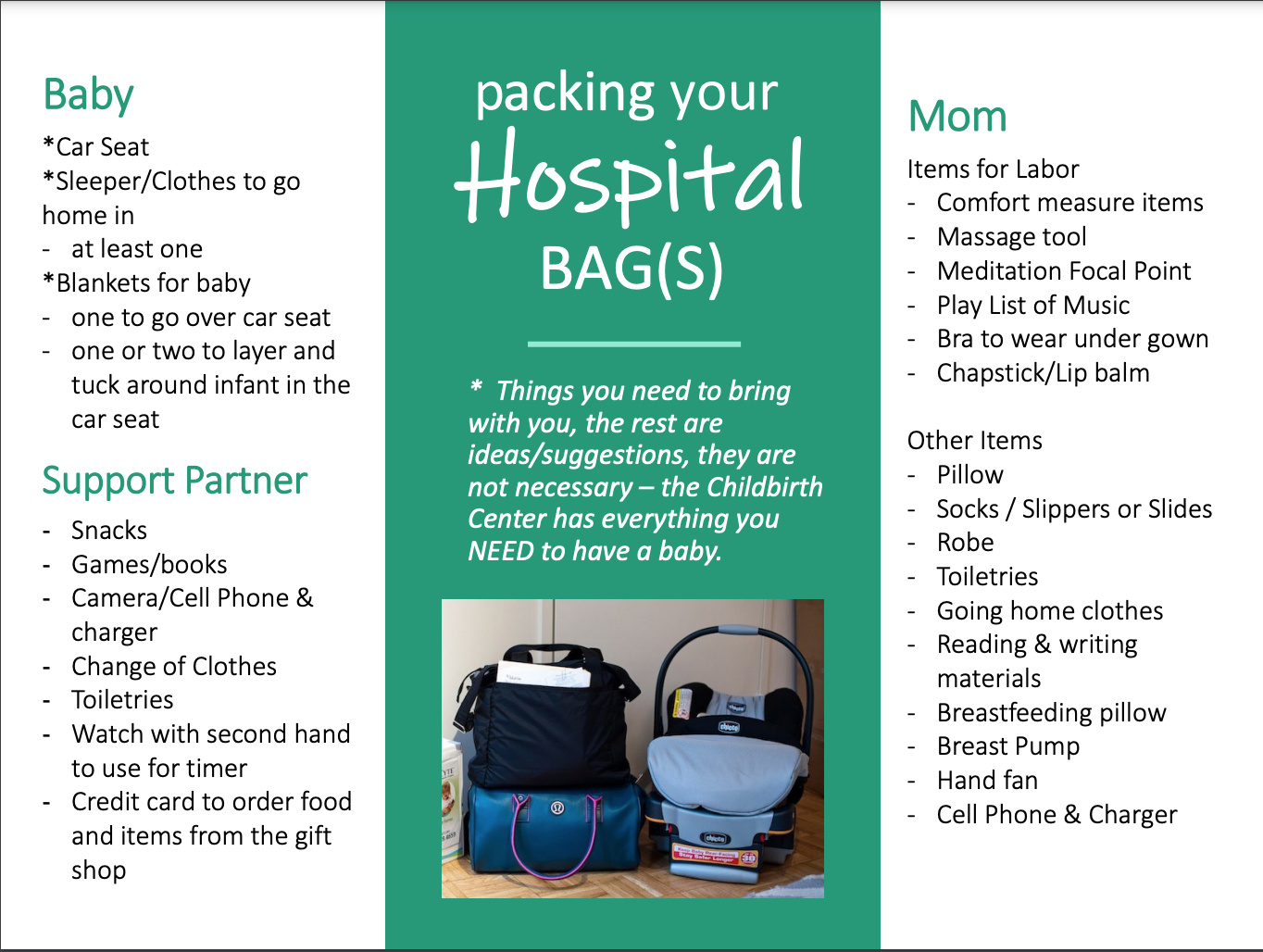 What To Bring To The Hospital
What To Bring To The Hospital
Find up-to-date information on the basics of breastfeeding, getting started, common difficulties and how to troubleshoot them:
Getting Started: What to Expect in the Hospital
Here at Hendricks Regional Health, we take pride in offering best practices in infant feeding care. While we strive to meet better breastfeeding outcomes, we are also mindful of the family's breastfeeding intentions and decisions. The following are some expectations you can expect to our approach while you are in the hospital to deliver your baby.
Labor and Delivery Care
Upon delivery, the newborn is placed skin-to-skin with the mother, allowing time for breastfeeding. Your feeding plan will be discussed early in the admission process in order for us to properly support your breastfeeding needs. Most mothers' milk will come in within 2-3 days (hopefully sooner!). Until then, the very small volume (2-10 ml/feed) you produce will meet your baby's nutritional and hydration demands.
Postpartum Care
Lactation assistance is offered from certified lactation consultants to the breastfeeding mother and infant; they offer supportive patient education and assessment throughout the hospital stay. We strive to keep the infant with the mother as much as possible throughout the day and night, without unnecessary separation or restrictions. The breastfed infant is only offered supplements (infant formula, water, and glucose water) when medically indicated.
Discharge Care
The breastfeeding mother and infant have access to lactation support while at home, and patient discharge gifts contain no infant formula marketing samples. Our lactation consultants are available via phone or email to assist with any questions or concerns.
After Delivery: Support & Resources
All About Pumps
There are lots of breast pumps available, but they are not all the same. Choosing a breast pump for your specific needs is important. Insurance often will cover the cost of a breast pump too. If you have questions, our Breastfeeding experts can answer questions anytime at
lactation@hendricks.org or 317-745-8448
Choosing A Breast Pump;
Insurance And Breast Pumps
Mommy Xpress Prescription Form (You will need your Provider to sign it and then you can submit it through their website [upload, text, email or fax]).
Mommy Xpress
How to Keep your Breast Pump Kit Clean
How to Store & Prepare Breastmilk for Feeding
Online Resources
CDC
KellyMom
Mommy Express
Women's Health
Baby Gooroo
Community Resources
Register for Latch Hour
Hendricks Regional Health Childbirth Center Support Groups
Indy Lactation Care
La Leche League of Indiana
Baby Talk Support Group for Moms
Milk Suppression
After delivery your body releases hormones which trigger the production of breast milk. You may feel fullness or tenderness in your breasts and leaking of breastmilk as early as one or two days after delivery and as late as 5 to 7 days. This is called engorgement and may take a few days to resolve. If you are not breastfeeding it may take as long as 6 weeks to completely ‘dry up’.
Evidence-Based Treatment
- Do not bind your breasts. It is important to wear a supportive bra, binding your breasts or wearing a bra that is very tight and/or has an underwire can lead to infection.
- Ice packs after breastfeeding or pumping
- Turn back to the flow of the water in the shower. Heat can increase swelling.
- Use Tylenol or Ibuprofen if approved by your Provider/Doctor.
- Hand expression or pumping before feeding just until breast is softened enough for infant to latch and breast pads for leaking
- Cabbage leaves are often used to help relieve engorgement
- Call a Lactation consultant at 317-745-8448 or email them at lactation@hendricks.org
When to call your Doctor
- A low-grade fever for more than 24 hours
- Temperature 100.5 or higher at any time
- Flu-like symptoms or headache
- Red, hot painful breasts or area(s)
- These symptoms may indicate an infection called ‘masitis’, which can be very serious. You may need to see your physician or be started on antibiotics. Call your Provider or Doctor immediately.
We Are A Milk Bank Partner
The
Milk Bank of Indiana provides pasteurized donor human milk to hospitals to help save lives. Hendricks Regional Health is a proud partner with the Milk Bank and is the only milk depot site in Hendricks County.
- As a Milk Depot Site we provide a convenient drop-off location for women who are a registered donor and want to donate their extra breast milk. Donations are sent to the Milk Bank for processing and then to hospitals that care for infants that are premature or sick.
- At HRH we are able to provide donor milk for babies in our own Special Care Nursery for circumstances when mother’s breastmilk is not available.
- For more information on the collection process, or on how to become a donor call (317)745-8448 or email lactation@hendricks.org
Lactation After Loss
After a pregnancy or infant loss you may still experience your milk coming in. You may notice leaking of milk, swelling and tenderness of your breasts within 2 to 5 days after delivery and it may last up to 6 weeks.
Breast normalcy and comfort may take up to one week and complete suppression of milk up to six weeks depending on activity and care of breasts. We recommend that you rest, drink to thirst, eat a regular diet, take prescribed pain medications to reduce swelling and discomfort, and begin some treatment methods to assist in the suppression process. Contact our lactation consultants at (317) 745-8448 for further advice and assistance.
For some mothers, it can be very healing to pump their breast milk and donate it to another baby in need. Breast milk donated to The Milk Bank through our milk collection depot is provided to premature babies and very ill infants. While the idea of pumping can be too difficult for many mothers, those who feel drawn to the idea usually take great comfort in their ability to put their baby's milk to use. To begin the donation process, contact our team at (317) 745-8448.
Milk Bank
Information on breast milk suppression and breast care provided by Mother Care by Sherokee Ilse; Breastfeeding Review and Lactation After Loss...A guide for bereaved mothers, Empty Arms Bereavement Support.
</h2">